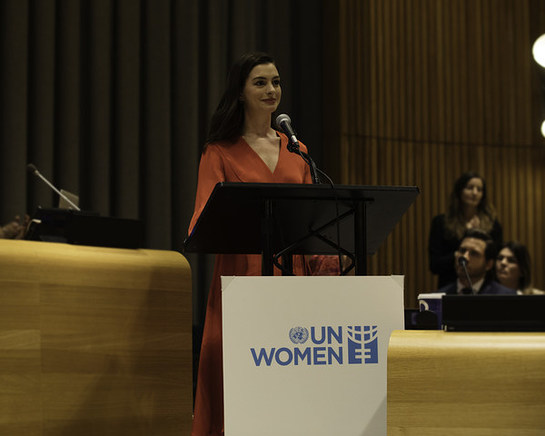UN Women Goodwill Ambassador Anne Hathaway has spoken today at the UN official commemoration of International Women’s Day in New York.

“In late March, last year, 2016, I became a parent for the first time. I remember the indescribable — and as I understand it universal — experience of holding my week-old son and feeling my priorities change on a cellular level,” she said. "I remember I experienced a shift in consciousness that gave me the ability to maintain my love of career and cherish something else, someone else, much, much more. Like so many parents, I wondered how I was going to balance my work with my new role as a parent, and in that moment, I remember that the statistic for the US’s policy on maternity leave flashed through my mind.
“American women are currently entitled to 12 weeks’ unpaid leave. American men are entitled to nothing. That information landed differently for me when, one week after my son’s birth I could barely walk, when I was getting to know a human who was completely dependent on my husband and I for everything, when I was dependent on my husband for most things, when we were relearning everything we thought we knew about our family and relationship. It landed differently.
“Somehow, we and every American parent were expected to be “back to normal” in under three months. Without income. I remember thinking to myself, “If the practical result of pregnancy is another mouth to feed in your home and America is a country where most people are living paycheck to paycheck, how does 12 weeks unpaid leave economically work?”
“The truth is, for too many people it doesn’t. One in four American women go back to work two weeks after giving birth because they can’t afford to take any more time off than that. 25 per cent. Equally disturbing, women who can afford to take the full 12 weeks often don’t because it will mean incurring a “motherhood penalty”— meaning they will be perceived as less dedicated to their job and will be passed over for promotions and other career advancement. In my own household, my mother had to choose between a career and raising three children- a choice that left her unpaid and underappreciated as a homemaker- because there just wasn’t support for both paths. The memory of being in the city with my Dad is a particularly meaningful one since he was the sole breadwinner in our house, and my brothers and my time with him was always limited by how much he had to work. And we were an incredibly privileged family—our hardships were the stuff of other family’s dreams.
“The deeper into the issue of paid parental leave I go, the clearer I see the connection between persisting barriers to women’s full equality and empowerment, and the need to redefine and in some cases, destigmatize men’s role as caregivers. In other words, to liberate women, we need to liberate men.
“The assumption and common practice that women and girls look after the home and the family is a stubborn and very real stereotype that not only discriminates against women, but limits men’s participation and connection within the family and society. These limitations have broad-ranging and significant effects, for them and for children. We know this. So why do we continue to undervalue fathers and overburden mothers?
“Paid parental leave is not about taking days off work; it is about creating freedom to define roles, to choose how to invest time, and to establish new, positive cycles of behavior. Companies that have offered paid parental leave for employees have reported improved employee retention, reduced absenteeism and training costs, and boosted productivity and morale. Far from not being able to afford to have paid parental leave, it seems we can’t afford not to.
“In fact, a study in Sweden showed that every month fathers took paternity leave, the mothers’ income increased by 6.7 per cent. That’s 6.7 per cent more economic freedom for the whole family. Data from the International Men and Gender Equality Survey shows that most fathers report that they would work less if it meant that they could spend more time with their children. How many of us here today saw our Dads enough growing up? How many of you Dads here see your kids enough now?
“We need to help each other if we are going to grow.
“Along with UN Women, I am issuing a call to action for countries, companies and institutions globally to step-up and become champions for paid parental leave. In 2013, provisions for parental leave were in only 66 countries out of 190 UN member states. I look forward to beginning with the UN itself which has not yet achieved parity and who’s paid parental leave policies are currently up for review. Let us lead by example in creating a world in which women and men are not economically punished for wanting to be parents.”
To read her full speech, click here.





